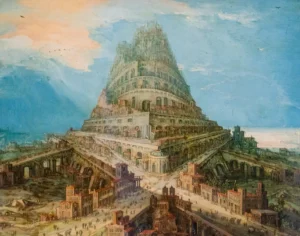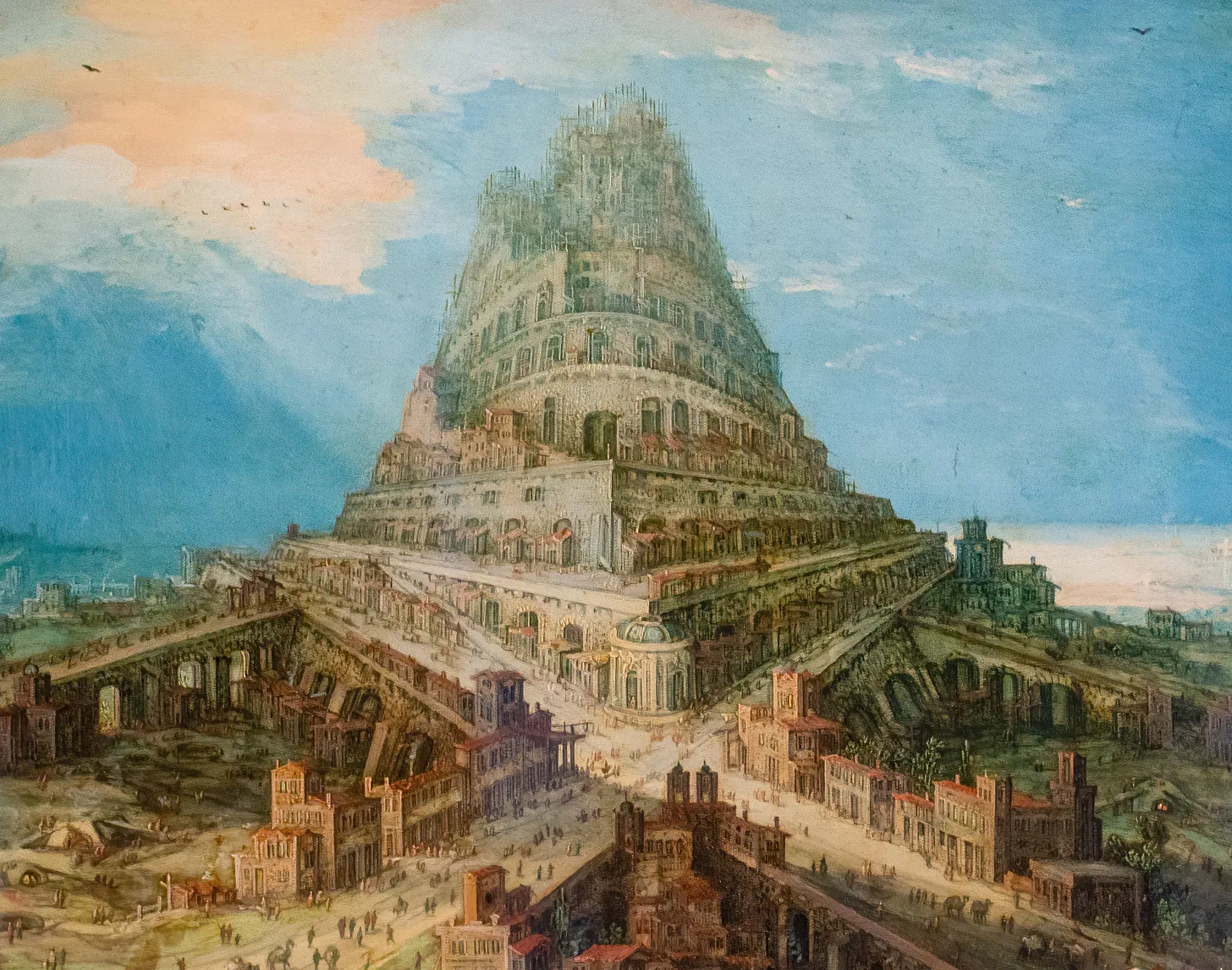
Pharaoh’s Army had them trapped on the shore of the Red Sea. Israelites fleeing Egyptian oppression could only hope for a miracle. A pillar of cloud separated 600 charioteers from escaped slaves numbering a few million.
Suddenly the Sea parted, a gusty east wind blew all night long to dry the seabed and the next morning the Israelites walked through the steep walls of water. When the pillar of cloud was removed, the Egyptians took up the pursuit into dried seabed – there, the wheels fell off their chariots and the walls of water collapsed, drowning horses and horsemen alike.
Some downplay this miracle by depicting a crossing of the Nile Delta to the Mediterranean Sea or the “Bitter Lakes” above the Gulf of Suez, or a swamp or shallow water with reeds, or even put their passage at the Gulf of Aqaba on the east end of the Sinai Peninsula (changing the location of Mount Horeb or Sinai, among other sites mentioned in Exodus 13 and 14).
However, the biblical narrative gives timing and geographical clues identifying when and where the Israelites amassed before crossing the Red Sea: the seventh day after beginning their Exodus and in a box canyon at the upper end of the Gulf of Suez.
On this seventh day of the spring holy week of unleavened bread about 3,460 years ago, the Israelites were entrapped, and it seemed like they were going back into the slavery they had emerged from only a week earlier.
They had come out of Egyptian civilization with a “high hand” and pillaged their enslavers for valuables they had earned in bondage. They kept the first day of unleavened bread at Succoth, then set out to the shore of the Red Sea, following the pillar of cloud by day and fire by night…in haste, having only unrisen bread for eating. The depths of the Sea were in front of them and the pursuing Egyptian chariot forces was behind them.
That night God worked His great miracle of parting the waters (which may have been 90 to 230 feet deep) and the Israelites crossed anywhere from 12 to 20 miles to the Sinai Peninsula the next morning.
In those days of unleavened bread Israelites were supposed to leave their old lives of enslavement and helplessness to their masters and the idolatry and immorality and lusts and complaining behind them; in crossing the Red Sea; they were baptized in what should have been a watery grave, while their slave-masters and all their oppression and imposition of sin died when the walls of water were collapsed by God; from then on, they were to live a new life and a new way of life in obedience to God their Deliverer.
Is that what happened? Unfortunately, “No!” Paul continues in First Corinthians 10…not only had they ALL left Egypt and the world of enslavement to sin; not only were they ALL baptized in what should have been a watery grave for them; not only were they moving to a new life with God, but verse 3:
“…ALL ate the same spiritual food, and ALL drank the same spiritual drink…”
No exceptions: ALL the Israelites came out of enslavement, ALL were baptized, ALL were to live a new way of life and ALL partook of the same spiritual food and drink!
Let us review some scriptures that detail how you and I can relate to the Israelites and their experience in leaving Egypt:
1. ALL Israelites were freed from the slavery imposed on them from the time of a Pharaoh who did not know Joseph, the patriarch who brought his whole family into Egypt centuries earlier. Their ordeal is described as “hard bondage,” and featured building cities with palaces and pagan edifices and idolatrous statues.
Apparently, they could not observe the Sabbath day – the concept seemed new to them when manna was introduced; they weren’t paid wages, which is why they “spoiled” their masters on the way out of Egypt.
They were not even free to let their own children live – for example: the massacre of male infants in the time of Moses’ birth.
Justice was non-existent for Israelites in Egypt – they were disposable slaves within that civilization, culture and life with all its oppression and cruelty and inherent sin!
About six months after writing his letter to the Corinthians in A.D. 55, Paul addressed the Christians in Rome – a city largely built and served by slaves (some of whom were members of God’s Church), and where he himself was a prisoner toward the end of his life – recognized the “hard bondage” of being forced to work for unjust masters in an evil world to build their legacy.
Mass killing of people and even infants was not beyond the Romans and their rulers; God’s law was not easy to follow, and, during different periods, punishable by death in that world; justice for any but those who had Roman citizenship was non-existent.
The first century in Rome and the Roman Empire was laden with sin – you either participated in it or compromised with it to survive. In the 6th chapter of Romans, verses 17 and 18, Paul declares – from The Amplified Bible:
“But thank God, though you were once slaves of sin you have become obedient with all your heart to the standard of teaching in which you were instructed and to which you were committed. And, having been set free from sin, you have become servants of righteousness – of conformity to the divine will in thought, purpose and action.”
And what does being set free from sin mean to you and me, upon whom the ends of the ages have come? In Revelation 18:4, God’s people are commanded to come out of an end-time Babylonian world, lest they share in its sins and have part in the plagues coming upon it.
2. ALL Israelites were baptized in walking along the wind-dried seabed between two towering walls of water and the cloud overhead into the way God led them through Moses.
This may have been an act of desperation by many if not most of the Israelites standing on the western bank of the Red Sea: with certain death in being driven into water as deep as 230 feet in front of them or facing a really upset group of Egyptians in chariots behind them.
Whatever their reason for entering the Sea once parted, they did, and they were baptized by “immersion” – in effect entering a watery grave that was meant to dispense with their old lives of enslavement and sin in Egypt.
Returning to Romans 6 and verse 3, Paul covers one of the foundational doctrines of the faith once delivered and how it relates to you and me once we forsake the world and commit to come out of its systems, customs, traditions and beliefs – again, in The Amplified Bible:
“Are you ignorant of the fact that all of us who have been baptized into Christ Jesus were baptized into His death? We were buried therefore with Him by the baptism into death, so that just as Christ was raised from the dead by the glorious power of the Father, so we too might now habitually live and behave in newness of life.”
Continue in verse 7 of Romans 6 for further explanation of what this “death” means:
“For when a man dies he is freed – loosed or delivered – from the power of sin…verse 11…Even so consider yourselves also dead to sin and your relation to it broken, but that you are alive to God – living in unbroken fellowship with Him in Christ Jesus. Let not sin therefore rule as king in your mortal bodies, to make you yield to their cravings and be subject to their lusts and evil passions…”
The baptism by water immersion, that we undergo after forsaking our former wrongful conduct and behaviors and habits, symbolizes the death of our old selves in a watery grave, where we left the old man and our previous life of practicing sin.
A different metaphor is found in Colossians 2:11, but the same idea – from The Amplified Bible:
“In Him also you were circumcised with a circumcision not made with hands, but in a spiritual circumcision performed by Christ by stripping off the body of the flesh – the whole corrupt, carnal nature with its passions and lusts – when you were buried with Him in baptism, in which you were also raised with Him through faith in the working of God as displayed when He raised Him up from the dead…”
Baptism means not seeing any good purpose for continuation of our life in bondage to this present evil world and the sin we practiced merely by virtue of our humanity and the lust of the flesh, the lust of the eyes and the pride of life.
3. ALL were to embark on a journey of newness of life – a life that God wanted the Israelites to embrace after they were delivered from the bondage of Egypt and the oppression of that sinful environment. This was made possible by baptism they underwent in crossing the Red Sea, which should have been the death of their old existence and their lusts and wrong way of living.
Unfortunately, the Israelites never embraced the new life that God offered them beyond that and constantly disobeyed and murmured and grumbled and complained and rebelled against the way of life that God, directly, and through Moses, was trying to get them to.
This “newness of life” that God wants for you and me was mentioned earlier in reading Romans 6 and Colossians 2, but perhaps the best description of this “newness” of life is found in the 4th chapter of Ephesians, verses 17 to 21:
“This I say, therefore, and testify in the Lord, that you should no longer walk as the Gentiles walk, in the futility of their mind, having their understanding darkened, being alienated from the life of God, because of the ignorance that is in them, because of the hardening of their heart; who being past feeling, have given themselves over to licentiousness, to work all uncleanness with greediness.
“But you have not so learned Christ, if indeed you have heard Him and have been taught by Him, as the truth is in Jesus: that you put off, concerning your former conduct, the old man which grows corrupt according to the deceitful lusts, and be renewed in the spirit of your mind, and THAT YOU PUT ON THE NEW MAN which was created according to God, in righteousness and true holiness.”
- Do I still lie or am I careful to be truthful in every circumstance?
- Is my reaction to things that don’t go my way anger or do I handle it patiently?
- Do I take what is not rightfully mine or only accept what I have earned?
- What about my language (not just foul) – murmuring or grace to those who hear me?
- What are my motives in what I do: malice and deceit or sincerity and truth?
- Is God well pleased with the “newness of life” that He sees in you and me?
4. ALL ate of the bread from heaven. It would have been nice if the Israelites had accepted the manna from heaven provided for them each day and even followed instruction as to when to gather and when not to. Accepting instruction about the Sabbath in being grateful for this sustenance, that was spiritual in nature, was what God was looking for from them.
But they grudgingly ate it because they had nothing else; they violated the Sabbath by going out to gather it when they should have saved a double-portion the previous day. They did not appreciate this bread in any way for the forty years they were fed on it.
In the book of John, chapter 6 we see how Jesus related to this event and expanded on it while teaching in Capernaum by the Sea of Galilee. We could read the whole story from His feeding the 5,000 with bread and fish and still had bread to spare after everyone ate; how some of these people came to seek Jesus the next day; how some still wanted a “sign” to believe Him. Verse 31:
“Our fathers ate the manna in the desert; as it is written, ‘He gave them bread from heaven to eat.’ Then Jesus said to them, ‘Most assuredly, I say to you, Moses did not give you the bread from heaven, but My Father gives you the true bread from heaven. For the bread of God is He who comes down from heaven and gives life to the world.’ Then they said to Him, ‘Lord, give us this bread always.’ And Jesus said to them, ‘I am the bread of life. He who comes to Me shall never hunger…”
We find in verse 41 that the Jews did exactly what their forefathers did: they murmured – “who does He think He is; we know all about His family and now He claims to be the bread of life.” Continue in John, chapter 6 and verse 3:
“Jesus therefore answered and said to them, ‘Do not murmur among yourselves. No one can come to Me except the Father who sent Me draws him; and I will raise him up at the last day.
“It is written in the prophets, ‘And they shall ALL be taught by God.’ Therefore, everyone who has heard and learned from the Father comes to Me. Not that anyone has seen the Father, except He who is from God; He has seen the Father.’
“’Most assuredly, I say to you, he who believes on Me has everlasting life. I am the bread of life. Your fathers ate the manna in the wilderness and are dead. This is the bread that comes down from heaven that one may eat of it and not die.’
“’I am the living bread which came down from heaven. If anyone eats of this bread, he will live forever; and the bread that I shall give is My flesh, which I shall give for the life of the world.’”
Now that we have come out of the bondage of sin, been baptized in a watery grave, and walk in newness of life, we must eat of the spiritual bread of life – Christ Himself – in partaking of His flesh and sacrifice given for the life of the world and each of its inhabitants, including you and me!
In verse 66, we find that most of the disciples murmured and walked with Him no more because of this “hard saying.” Is God well pleased that we have accepted this teaching fully?
5. ALL drank the same spiritual drink. At Massah and Meribah the Israelites contended with Moses – they were ready to kill him and tempted God with their murmuring.
Moses struck the Rock with his staff and water came forth to slake the thirst of up to 3,000,000 persons – and this spiritual Rock that produced water was Christ.
Spiritual water is what we are after: we should seek that water; we should earnestly ask God for it; and we should be grateful when we receive it.
In John 4 – Jesus is in Sychar, a Samaritan area and asks a woman to give Him a drink; she is astounded that a Jew would ask a Samaritan for a drink of water – verse 10:
“Jesus answered and said to her, ‘If you knew the gift of God, and who it is who says to you, “Give Me a drink,” you would have asked Him, and He would have given you living water.’
“The woman said to Him, ‘Sir, You have nothing to draw with, and the well is deep. Where then do You get that living water? Are you greater than our father Jacob, who gave us the well, and drank from it himself, as well as his sons and his livestock.’
“Jesus answered and said to her, ‘Whoever drinks of this water will thirst again, but whoever drinks of the water that I shall give him will never thirst. But the water that I shall give him will become in him a fountain of water springing up to everlasting life.’”
We ALL might reflect on the miraculous events celebrated during this spring holy day season. Its events do not just have meaning for ancient Israelites, but for modern day Christians:
We have been freed from the hard bondage of sin that characterized our former lives.
We have been baptized in a watery grave and the old sinful man is now buried and no longer dominates.
We have risen from baptism as a different person, committed to walk in newness of life.
We have partaken of the spiritual bread of life, Jesus Christ, sacrificed for ALL mankind to enable eternal life.
We have access to God’s holy spirit – the spiritual water that is likened to a river or fountain springing up to produce eternal life.









